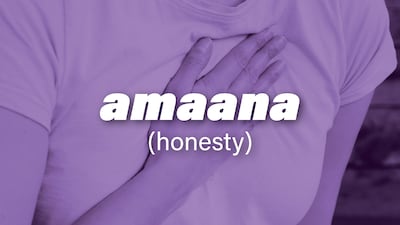Honesty is complicated. Regarded as a virtue across cultures and religions, it is coded in language and how we communicate.
To tell a lie is to deceive, contort and conceal. Of course, we can imagine several grey instances where lying can be vindicated, maybe even be regarded as the right thing to do. In any case, the ability to lie is pretty remarkable.
We render reality through language and can modify it with words. It can represent how we would like reality to be, and yet, the farther we stray from honesty, the more burdened we become. Whether due to eons of codified sociocultural norms and expectations or something deeper, honesty seems like the foremost step in living lightly.
Amaana is Arabic for honesty, and the word resonates with the merits of truthfulness, often converging with the spiritual.
Ameen, a common name in the Arab world, is a person who lives honestly. The word also means faithful. Amaanat can refer to money or an object given for safekeeping. Khiyanat al amaana is cheating someone. Khiyanat al amana al zawjiyya is falling short on the edicts of marriage. Amaanat al sundooq is a funds secretariat. The secretariat general of a council is known as al amanaa al aama. A secretary general is ameen al aam.
There are several idioms that stress the importance of honesty and warn against lying (kizb), as a way of living with an unclear conscience.
Man dayyaa al amaana wa radiya bil khiyana faqat tabarrat minhu al diyana is a common saying that brands lying as a way of straying from the divine.
Adaa al amaana miftah al rizk means honesty is the key to livelihood.
Adda wajibahu bi ikhlas wa amaana is when a person carries out their duty with devotion and honesty.











































































